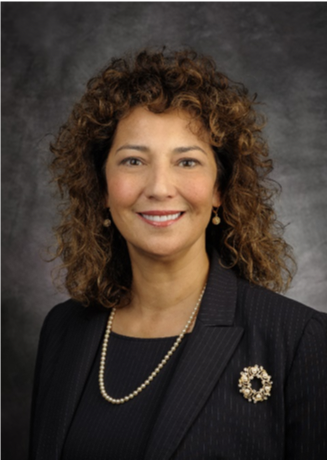Theresa Maldonado charts a new path for UC research
Share This Article

Theresa Maldonado’s first full day on the job as vice president of UC’s Office of Research and Innovation was March 11, 2020. By 4:30 that afternoon, the Office of the President was beginning to transition non-essential employees to remote work in response to the coronavirus pandemic. It was a hectic and unprecedented time for employees throughout the university — but perhaps nowhere more so than within the university’s research labs. From her first day, Theresa found herself in a crucial, pivotal role.
Onboarding in a pandemic
Since March 12, Theresa has been holding almost daily meetings with the vice-chancellors for research (VCRs) on each campus (only one of whom she’s met in person) to determine how to keep university research moving forward as social, academic and commercial spaces shutter worldwide. The mitigating factors are numerous and complicated — from environmental health and safety to research animal colonies to lab access and protocols for essential COVID-19 research personnel, not to mention logistics around grant funding, employee compensation, personal protective equipment supply chains, international employees and retaining federal grant funding.
Much of Theresa’s role has centered around providing systemwide forums for VCRs to develop mutual understanding and protocols as the pandemic and global response evolves. She has identified and invited guest speakers to provide expertise — from the House Science Committee on Capitol Hill to the National Science Foundation (NSF) and National Institutes of Health — and has encouraged VCRs to collaborate in devising solutions for research continuation. “The VCRs joke amongst themselves that it took a pandemic to bring them together, but these are brilliant people who are representing many types of campuses — from large research campuses to growing campuses and national labs. They typically compete for grants and funding, so this is one of the first instances in which their priorities have aligned. Trying to keep research personnel safe is priority number one, and doing no harm to the largest research institution in the world is second,” Theresa explains.
Devoted to excellence and resilience
UC research couldn’t be in more capable hands. Theresa brings to the table 29 years’ experience at four universities, as well as time spent as a leader at the NSF. (Read her hiring announcement by UC Provost and Executive President of Academic Affairs Michael Brown.)
When thinking about the path that’s brought her here, Theresa still remembers a pivotal moment 27 years ago when someone from the NSF reached out to suggest she apply for a position as division director of the Engineering Education and Centers Division. At the time, she was working at the University of Texas at Arlington. She was a single mom and the only woman in her department; a Mexican-American, she was also the only underrepresented minority in the entire College of Engineering. Still, she applied to the NSF position, got it and worked there for two years. “It changed my life,” she recalls.
Working at the NSF taught her the power of interdisciplinary research and partnerships between institutions. It also demonstrated the power of improving diversity in science and engineering, and the possibilities that could come about because of that. A few years later, she returned to UT Arlington to accept a promotion as associate dean for research. Since then, she’s remained in research leadership and strategy roles. “It’s so much fun to listen to the ideas that people come up with that could be very important and have a large impact on society,” she says.
When asked how her identity as a woman and underrepresented minority has impacted her leadership experience, Theresa explains that it has taught her resilience. She is the first person in her family to attain a higher education degree. “The whole process of existing within higher ed, even beginning with my Ph.D., has been difficult because of what I look like,” she says. “I’ve had experiences that I know would shut down some people. But they have made me much stronger and wiser.”
As her career progressed, Theresa decided to help others follow in her footsteps. She applied for a position as dean of engineering at the University of Texas, El Paso, because it is a Hispanic-Serving Institution. In this role, she found that female Hispanic students, in particular, were craving and searching for role models.
“There’s a lot of need for role models to show students what’s possible,” she says. “My own role models have been white men because there have been hardly any women to connect with in my field and very few people of color. Because of that experience, I know that in my position, part of my impact is silent — it’s what I represent.” As dean, she made an effort to learn students’ names, to understand their interests and most of all, to treat them with respect. “These students need someone to look up to — someone who looks like them; someone who represents what they can become.”
For this reason, her decision to leave UT El Paso to accept her current role at UC was bittersweet. Still, she recognizes her capacity for impact at a systemwide level upon the hundreds of thousands of students that UC serves each year.
“It’s easy for any strong institution to rest on its laurels, but my sense of UC is that it doesn’t; it’s striving for excellence at all times. A crisis like a pandemic tests any organization. But our strength will be demonstrated by how we come about on the other side. And in my experience with the VCRs and the leadership of UC, I know that we are poised to be a national example of how a university can make it through a situation like this and come out stronger.”
